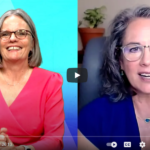
Mastering Long Life Planning for Happiness & Security
October 16, 2023
Preventing Financial Fraud As We Age
December 14, 2023
When Moneygeek.com reached out for expert advice on when to stop driving, I was eager to help with this important area of long life financial planning. I share highlights from the article below, but since this article was published, I heard about an idea that I wanted to share first.
One of the fascinating things about humans is that it is so hard to recognize a change in capacity from the inside. It often takes someone we’ve known for a long time to notice and tell us what they see. For instance, we might hold the idea that we are shy and uncomfortable in social situations, and we carry that story around even after we’ve stretched and grown through practice and strategies to where we find them tolerable, maybe even enjoyable.
The same dynamic is at play when our capacities diminish, which can happen as a part of normal aging. Driving is a place where it’s very common for other people to see what we can’t. It is hard to deliver, and hard to hear, the message that it’s time to give up driving.
The tip I want to share is this: sometime in your 50s, write a letter to your future self about what changes would trigger giving up the car keys. Describe what consequences might be showing up, such as dings on your fender from backing into parked vehicles or concrete poles. Write about what you’ve observed in folks who behave in ways that prompt you to say, “enough my friend,” such as failing to signal (or stop signaling), driving through stop signs, or near-misses of exits resulting in unsafe lane changes. Then give this letter to a dear friend or family member and ask them to keep it safe and give it back to you if this time should arrive.
See more in the article https://www.moneygeek.com/insurance/auto/resources/senior-driving-guide/#expert=miriam-whiteley-cfp-rlp-ceft
What specific challenges do seniors face behind the wheel?
Aging can bring physical and mental changes that potentially impair one’s ability to drive safely: cognition, coordination and sensation, insight and awareness, memory and judgment, reaction times, strength and flexibility and visual fields.
What can older drivers do to stay behind the wheel as long as possible?
Dr. Peter Attia names the time between life expectancy and when we experience age-related changes that diminish function our “healthspan.” His advice to lengthen “healthspan” and shorten “sickspan” is to move, including strength training with weights or bands, mobility and balance activities such as stretching and yoga, and walking, biking or a sport like pickleball.
What is the most compassionate, successful method for easing a senior driver off the road?
What tends not to work very well is going on the offense and removing this fundamental symbol of autonomy without working up to it thoughtfully. This requires an awareness of the tension that exists between the family member’s wish for their loved one’s safety (as well as the safety of innocent folks on the road with them) and the senior driver’s desire for independence.
Start early. Make the topic familiar to discuss before intervention is required. What circumstances or experiences would trigger the need to give up the car keys down the road? The point is to ponder, without the pressure of needing to do anything, what challenges can be anticipated.
Then, consider what alternatives might be available. The availability of Uber drivers, for instance, has made it much easier for some seniors to imagine that they can maintain their independence without the strain and expense of keeping a car.
Thirdly, consider what resources are available. For example, there are online assessments and resources from AARP and Elder Guru. There are also professionals who offer driver evaluations, training and rehabilitation. Sometimes the easiest thing is to ask your loved one’s neurologist or doctor to recommend this evaluation. Having the keys taken away by someone who isn’t family is sometimes much easier to handle.
Senior Driving Resources
Staying safe on the road requires some extra effort, and the decision to retire from driving can be a difficult one. See link to article for resources for help and support.
